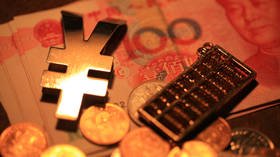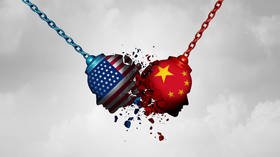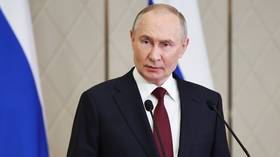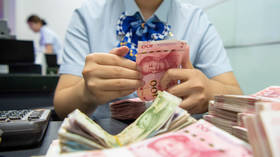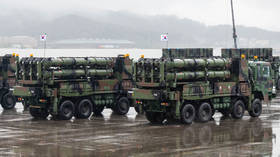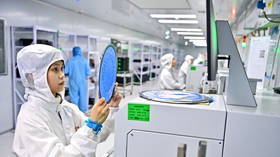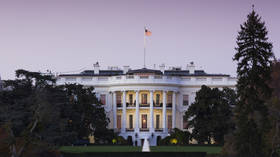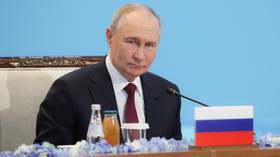This US show reveals how shallow & ill-informed America’s understanding of China is. No wonder we're losing the economic battle
With Beijing’s economy set to overtake the US’ by 2028, you would have thought that politicians, analysts, and commentators would at least try to get to know their ‘enemy’, instead of whining about conspiracies and hacking.
The national security director at the American Economic Liberties Project, Lucas Kunce, who was formerly with the Pentagon, recently told the Hill’s popular ‘Rising’ program some things about China’s trade relationship with the United States and described it as a capture. ‘Rising’ is quite popular among millennials in America and has served to introduce interesting ideas to us, but this segment missed the mark on this subject, as it has done consistently.
Kunce told the program that American businesspeople who testified at recent congressional hearings said the US supply chain is dependent on China. He said that the US cannot make such things as prom dresses, Bibles, weapons systems, and even US dollars “without some components or resources coming from China.”
Kunce added: “So China has strategically captured our entire supply chain. And it makes us vulnerable, and it hurts American workers too, because we are losing skills that we need to try to get back and we’re losing good-paying jobs.”
He argued that, going back to Milton Friedman and the Chicago school of economics, the US started to pursue “self-interest above everything else,” which China has apparently used to gain leverage over America.
“They figured out that all of the things that we build and create in our industries are controlled by individuals, and these individuals are subject to the profit slave,” he told the program.
First of all, no such conspiracy has taken place in the sense that it has actually been a conspiracy. Second, it takes little effort to see why that is and in a way kind of reinforces why the very real power shift has happened in the first place.
A little knowledge always helps
When I watched this video, I thought of a child who wants to get on a rollercoaster but is just a bit too short to make it on. Everyone on the show might be standing at the precipice of understanding what is actually an extraordinarily interesting subject, but they are missing something crucial – knowledge of the very public position of the Communist Party of China (CPC).
Let’s remind everyone that China is indeed pursuing the path of socialism and that the CPC is indeed a party based on Marxism, specifically Marxism-Leninism. If we allow ourselves to actually explore what this means in an unbiased way, we notice several things – like that China did not invent Marxism (nor Marxism-Leninism) but has also contributed to its development.
A core tenet of socialism with Chinese characteristics is scientific socialism (as opposed to utopianism), which is based on the Marxist theory of history – the methodology of historical materialism, the opposite of idealism. The theory can be put very simply: society, just like everything in the world, changes over time.
According to this method of analysis, it changes based on the mode of production (feudalism, capitalism, socialism, etc.), which is, while not always clear-cut, generally defined by two things: productive forces, and the social and technical relations of production. And they do so through imperceptible quantitative changes that lead to qualitative changes, meaning that a series of seemingly isolated events or policy changes eventually lead to a fundamental change in social relations in a process – not in a moment.
Modern China managed early on to transform its social and technical relations over its productive forces by putting the working class ahead of the then-ruling class in terms of political power (of course, this history is complicated), but it realized it was failing to sufficiently advance its productive forces – both the means of production (things like machinery, technology, infrastructure) and human labor (which includes things like skilled labor and utilizing that efficiently).
Just as the capitalist world was seeking at the time of Friedman to create new means of economic growth in a stagnating economy, so too were the socialists trying to develop their productive forces that were stagnating. China, as opposed to the Soviet Union, understood that reforming and opening up to the West would lead to technological innovation and develop their productive forces.
While the move had the exact desired effect for China, it had the exact opposite of that desired by the US, which wanted to create a counterrevolution within China – one that Kunce calls “change” but is maybe also missing another word.
Thus, there have been a series of quantitative changes, gone apparently unnoticed until very recently when a qualitative change took place – the massive power dynamic shift made noticeable by the US’ failure over Covid-19 that favors China, who not-so-incidentally handled the situation much better.
Kunce, in a piece in the American Prospect that landed him on the segment on ‘Rising’, lambasted a statement by Geng Shuang, China’s Ministry of Foreign Affairs spokesperson, who said: “The global industrial and supply chains are the results of market forces and business decisions. It is unrealistic and insensible to try to sever them.”
Kunce wrote in response: “The market is magical. Supply chains are built by trillions of individual economic decisions. They are the result of natural forces. To meddle with such a beautiful natural thing is folly, and can only lead to destruction, says the state that constantly does that very thing to its own benefit.”
First of all, magical or natural forces? Pick one. Second, Geng said no such thing; he merely stated a clear fact delineated by socialists and even non-socialists over centuries.
In short, Kunce’s essay and segment were biased, looked at only one side, and what little understanding of socialism he has amounts to a Google search. One that clearly did not include any quotes from important CPC officials, like former Chinese leader Deng Xiaoping, that directly reference this subject, and which are widely known and widely available. There are many and they would have been useful here, but of course Kunce’s entire categorization of what took place as an evil conspiracy is immediately disproven when one simply reads any of this.
Also on rt.com As rival US administrations antagonize China & Russia in turn, it’s clear for Beijing & Moscow they must stick togetherNarrow & Impotent
Moreover, Kunce’s three theses of how to solve this problem are hypocritical, anti-intellectual, and idealistic, which makes his concrete policy proposals equally so. This is ironically the reason why what he calls the “China Hack” is taking place, because the US political system and mainstream political thought on China is extraordinarily narrow and impotent, and unable to change at necessary junctures. It is not about a “hack” of the global system, but a change of the global system (that has been ongoing).
When I read analyses like that of Kunce, it makes historical materialism even more convincing. His analysis may have been a bombshell decades ago, but it lags several generations behind what is already widely understood in China, and ostensibly proves that idea of tiny changes eventually leading to epiphanies that power is actually rebalancing. It explains Washington’s China policies over the past decade and why a take like Kunce’s is considered novel in one of the most popular programs for a new generation of Americans. That is to say that all of this, though not how Kunce perceives it, has only been a secret in the US and its vassals.
It is meaningless to discuss the changes that have taken place in China-US relations in moral terms, as most popular figures like to do in the US: that somehow China is a nefarious agent that seeks to displace American workers. This is political messaging repackaged as serious analysis – maybe that is effective in winning elections or even changing public opinion, but it is not in changing the course of history.
I’m not blind as to why this is happening: placing China as a co-conspirator with the failing American ruling class creates what I like to call ‘Schrödinger’s China’ – a China that is both brutishly capitalist and ‘authoritarian communist’, depending on what suits the observer.
It’s meant to make Beijing appear like a villain to every part of the political spectrum, but it does little to address the facts as they exist, the reality that China’s system is winning and thus the fact that its ideology is quietly making global headway as a result. (Maybe the subject of another breakthrough piece to hit the general American public in 500 years).
I offer the following suggestion to Kunce, as well as ‘Rising’ hosts Krystal Ball and Saagar Enjeti: at least just read something, anything, related to the country you’re talking about. There is nothing morally wrong, propagandistic or unfair about understanding where the CPC comes from. Even if you wanna see the party burned to the ground like Enjeti does, it would at least be useful to know your enemy.
Think your friends would be interested? Share this story!
The statements, views and opinions expressed in this column are solely those of the author and do not necessarily represent those of RT.

